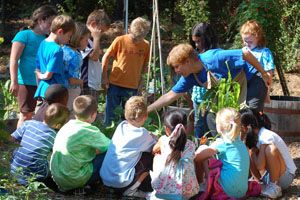Experience Our Outdoor Classroom

Curriculum-based outdoor field trips for elementary school students are offered from mid-September through the end of October, and mid-March through the first week in May. Due to the size of the gardens, we request that no more than two classes (or 50 children) attend on the same date. Please provide one adult chaperone for each 10 students. A fee of $5 per student is requested to cover materials. A picnic area is available for outdoor lunch after your field trip.
Field Trip Objectives
Although all Aldridge Gardens Field Trips can be adapted for a particular grade level, listed below is the grade level(s) each field trip is designed for and correlated with the Alabama State Course of Study:
Meet the Trees (Kindergarten)
-Observe, compare, and describe the properties of trees, and parts of trees.
-Compare changes in parts of trees through the seasons.
-Acquire the vocabulary associated with the properties and structures of trees.
-Use oral language to describe observations.
-Observe animals that depend of trees for food and shelter.
Habitat Hunters (1st through 5th grades)
-Discover ways animals use and depend on plants as well as ways woodland plants depend on animals.
-Observe ways that plants and animals in a forest community are interdependent.
A Worm’s-Eye View of Soil Science (2nd grade)
-Demonstrate an understanding of the concept that plants grow best in good soil and that good soil is made by combining sand, clay and humus.
-Differentiate among the properties of soil (color, texture, water absorption, temperature).
-Identify soil types/components (sand, clay, humus).
-Recognize the role of soil in supporting plant growth.
-Use appropriate tools to gather, analyze, and interpret data.
-Relate structure to function in plants (roots for support in soil).
Worms (Vermiculture) 2nd grade continued
-Demonstrate an understanding of the process of composting.
-Demonstrate the ability to perform safe and appropriate manipulation of living organisms.
-Identify characteristics and behaviors of worms that help them survive.
-Describe how worm offspring are similar to parents (size, shape, color).
-Describe interdependence of plants and worms (recycle plants into nutrient-rich humus, tunnels create spaces in soil for air and water).
-Make compost tea bags.
Plant Propagation: Making More Plants (3rd grade)
-Identify the basic parts of a plant and the function of each part: roots, stems, leaves, flowers.
-Identify the basic parts of a flower and the function of each part: petal, stamen, and pistil.
-Propagate plants using three different methods of propagation: seeds, cuttings, and division, and take their plants back to class.
Teachers: How to schedule a curriculum-based field trip
Field trips are scheduled weekdays from 9:30 - 11:30 a.m.
Maximum number of students per day = 50
$5 per student. (Free for teachers and parent chaperones.)
Field trips are scheduled from mid-September through mid-November
and mid-March through mid-May.
To schedule a field trip, please contact Katy Houston, Education Coordinator, at katy.houston@hooveralabama.gov or 205.739.6555.
Please include the following information:
-Teacher Name
-Cell or Home Phone
-Preferred Email Address
-Name of School
-School Address
-School Phone
-Name of School System
-Grade Level for Field Trip
-Number of Students for Field Trip
-Month You Would Like to Schedule
Include field trip topic you would like:
-Trees
-Habitat Hunters
-Worms and Soils
-Plant Propagation
Picnic Area is first come, first serve.
Please let us know if you plan to use the picnic area.













